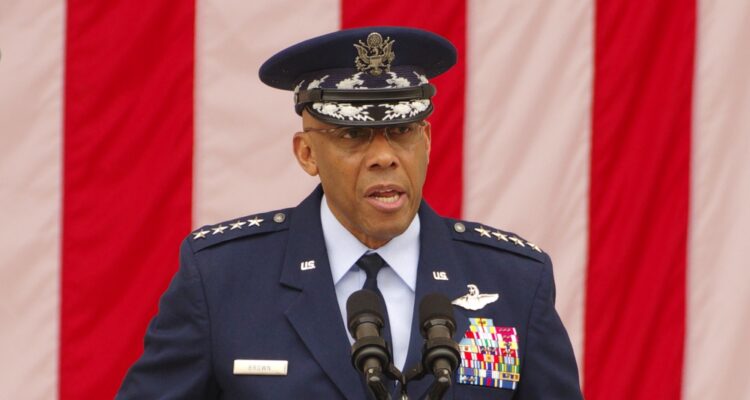Israeli pre-emptive strike on Hezbollah eased immediate danger of major war breaking out, said the Chairman of the Joint Chiefs of Staff, while adding that the threat of a regional escalation remains.
By Batya Jerenberg, World Israel News
The Chairman of the Joint Chiefs of Staff believes that the threat of a bigger war in the Middle East has been eased after Israel’s successful preemptive attack against Hezbollah, Reuters reported Monday.
Gen. Charles Q. Brown, Jr. flew into Israel Sunday to meet with the IDF’s top echelon and get briefed on the dangers posed from the terrorist organization’s forces along the Israel’s northern border.
He came mere hours after the Israeli air force destroyed thousands of rocket launchers primed and ready to fire at Israel from southern Lebanon, and Hezbollah responded by launching some 250 missiles and UAVs that caused one death, a few injuries, and some property damage, especially in Acre.
It was the most intense exchange of fire in the north since the Israel-Hamas war began October 7, and jingoistic rhetoric flew from both sides afterwards. But it did not set off the conflagration that Hezbollah and its Iranian boss threatened in retaliation for the July assassinations of Hezbollah’s top military commander Fuad Shukr in Beirut and Hamas leader Ismail Haniyeh in Tehran.
Israel took credit for Shukr’s elimination but has stayed officially mum regarding Haniyeh.
Asked by the news agency whether the immediate risk of a wider war had declined, Brown said, “Somewhat, yes. You had two things you knew were going to happen. One’s already happened. Now it depends on how the second is going to play out.”
“How Iran responds will dictate how Israel responds, which will dictate whether there is going to be a broader conflict or not,” he continued.
Tehran still “want[s] to do something that sends a message” to Israel, he said, “but they also, I think … don’t want to do something that’s going to create a broader conflict.”
He added that Iran has other proxies it can activate if it wants to go a different route, such as the Houthis in Yemen who have already launched several long-range missiles at Israel over the course of the ongoing war, as well as having disrupted international shipping by firing rockets at vessels crossing the Red Sea.
The general called them the “wild card” in the region, with the possibility that they could “actually go off and do things on their own because they’re not satisfied” with what their patron ends up doing.
Brown confirmed the beef-up of American military forces in the region to protect both its own troops and Israel in case Iran decides to launch an attack like it did in April, when it fired hundreds of missiles at the Jewish state that were almost all intercepted due to the combined effort of the IDF, the U.S. and other allies.
On Sunday, he pointed out, the U.S. had decided to keep two aircraft carrier strike groups in the Middle East, and an extra squadron of F-22 fighter jets.
“We are better postured” now than then, Brown said, in what could be seen as another warning to Iran to think again before acting.





